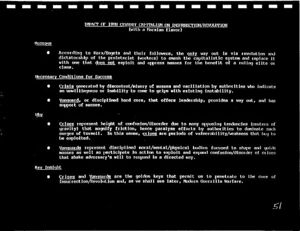Patterns of Conflict
| The works of |
| Works of John Boyd |
|---|
OODA WIKI Edition
Quantico Transcription
Of course, we go back and pretend we’re Marxist. Note that I say “with a Marxian flavor.” And the only way out is via revolution and dictatorship of the proletariat.
It turns out they didn’t have a dictatorship of the proletariat. Instead they had a dictatorship over the proletariats. In other words, they have a little mismatch between promises and reality also, a rather serious mismatch. In fact, as a result of that— remember, Marxism looked very good and communism looked very good before it was tested. After it was tested, it’s going through the test, now all of a sudden they find out it didn’t work. They went through extraordinary hops, skips and jumps trying to get their system sorted out.
Okay, necessary conditions for success: note this, crisis. You see it in their literature all the time.
You’ve got to get a crisis. In fact, I always make the point in science. Science depends upon anomalies. Without anomalies, you don’t have anything to work on. If you don’t pay attention to anomalies, you get mismatched. If you don’t pay attention to the mismatch, you get crisis. Without anomalies, no mismatch. Without mismatch, there’s no crisis. Without crisis, no change.
People don’t do a goddamn thing unless there’s a crisis, perceived or otherwise, and then they may not do it right. They recognize that, crisis is important. Because that crisis can be a danger, but as the Chinese say, it’s also what?
Audience: Opportunity.
Boyd: Exactly right. It’s also an opportunity. And the vanguard. Note the vanguard. [30:00] They always bring up the—what’s the vanguard? First they said— How many people read the “Communist Manifesto?” Probably some of you have read it. They talk about the proletariat being the vanguard of the revolution. Later on, they start talking about the Communist Party being the vanguard of the proletariat. Later on, they start talking about the Central Committee being a vanguard of the Communist Party and the Politburo being the vanguard—In other words, a very, very tight control over a very large ship. Vanguard inside vanguard inside— tight hierarchy.
And here’s how it works. Why? Because what happens, the crises then build up the vanguard. The vanguard then exploits the crises. You get this incestuous feedback loop, and you pull the whole thing apart from the inside. It’s in all their literature. You read American literature, we never even talk about that. But they keep bringing this up over and over again, in a key insight.
I think we’ve been here too long. You want to throw the towel in? I want to get up to World War I. Let’s just finish this. One more page, just one more page, and we’ll have to do World War I tomorrow night, I guess. I want to get through that.
[Cross talk]
